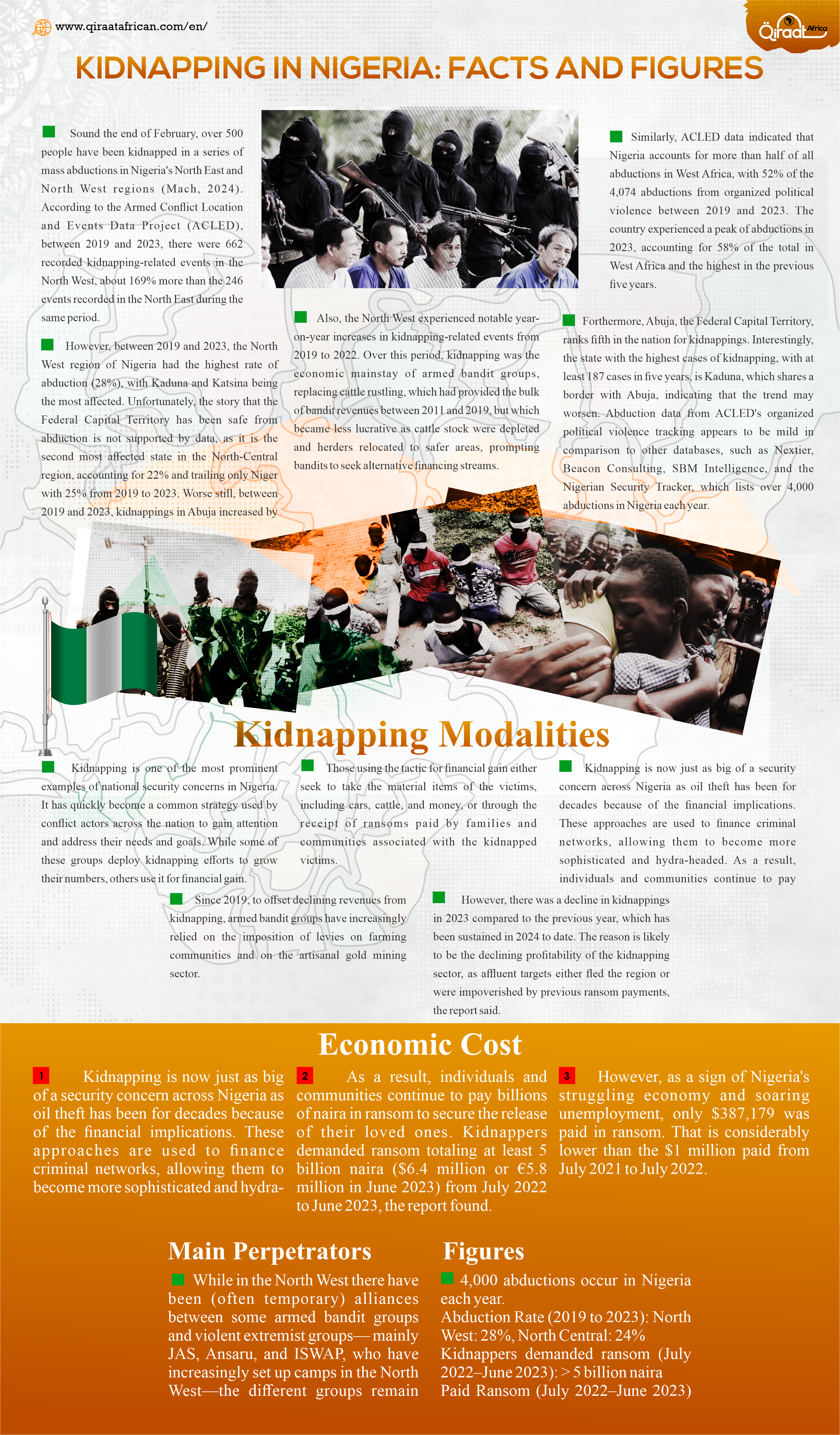
Since the end of February, over 500 people have been kidnapped in a series of mass abductions in Nigeria’s North East and North West regions (Mach, 2024). According to the Armed Conflict Location and Events Data Project (ACLED), between 2019 and 2023, there were 662 recorded kidnapping-related events in the North West, about 169% more than the 246 events recorded in the North East during the same period.
- Also, the North West experienced notable year-on-year increases in kidnapping-related events from 2019 to 2022. Over this period, kidnapping was the economic mainstay of armed bandit groups, replacing cattle rustling, which had provided the bulk of bandit revenues between 2011 and 2019, but which became less lucrative as cattle stock were depleted and herders relocated to safer areas, prompting bandits to seek alternative financing streams.
- Similarly, ACLED data indicated that Nigeria accounts for more than half of all abductions in West Africa, with 52% of the 4,074 abductions from organized political violence between 2019 and 2023. The country experienced a peak of abductions in 2023, accounting for 58% of the total in West Africa and the highest in the previous five years.
- However, between 2019 and 2023, the North West region of Nigeria had the highest rate of abduction (28%), with Kaduna and Katsina being the most affected. Unfortunately, the story that the Federal Capital Territory has been safe from abduction is not supported by data, as it is the second most affected state in the North-Central region, accounting for 22% and trailing only Niger with 25% from 2019 to 2023. Worse still, between 2019 and 2023, kidnappings in Abuja increased by 20%.
- Furthermore, Abuja, the Federal Capital Territory, ranks fifth in the nation for kidnappings. Interestingly, the state with the highest cases of kidnapping, with at least 187 cases in five years, is Kaduna, which shares a border with Abuja, indicating that the trend may worsen. Abduction data from ACLED’s organized political violence tracking appears to be mild in comparison to other databases, such as Nextier, Beacon Consulting, SBM Intelligence, and the Nigerian Security Tracker, which lists over 4,000 abductions in Nigeria each year.
Kidnapping Modalities
- Kidnapping is one of the most prominent examples of national security concerns in Nigeria. It has quickly become a common strategy used by conflict actors across the nation to gain attention and address their needs and goals. While some of these groups deploy kidnapping efforts to grow their numbers, others use it for financial gain.
- Those using the tactic for financial gain either seek to take the material items of the victims, including cars, cattle, and money, or through the receipt of ransoms paid by families and communities associated with the kidnapped victims.
- Kidnapping is now just as big of a security concern across Nigeria as oil theft has been for decades because of the financial implications. These approaches are used to finance criminal networks, allowing them to become more sophisticated and hydra-headed. As a result, individuals and communities continue to pay billions of naira in ransom to secure the release of their loved ones.
- Since 2019, to offset declining revenues from kidnapping, armed bandit groups have increasingly relied on the imposition of levies on farming communities and on the artisanal gold mining sector.
- However, there was a decline in kidnappings in 2023 compared to the previous year, which has been sustained in 2024 to date. The reason is likely to be the declining profitability of the kidnapping sector, as affluent targets either fled the region or were impoverished by previous ransom payments, the report said.
Economic Cost
- Kidnapping is now just as big of a security concern across Nigeria as oil theft has been for decades because of the financial implications. These approaches are used to finance criminal networks, allowing them to become more sophisticated and hydra-headed.
- As a result, individuals and communities continue to pay billions of naira in ransom to secure the release of their loved ones. Kidnappers demanded ransom totaling at least 5 billion naira ($6.4 million or €5.8 million in June 2023) from July 2022 to June 2023, the report found.
- However, as a sign of Nigeria’s struggling economy and soaring unemployment, only $387,179 was paid in ransom. That is considerably lower than the $1 million paid from July 2021 to July 2022.
Main Perpetrators
- While in the North West there have been (often temporary) alliances between some armed bandit groups and violent extremist groups— mainly JAS, Ansaru, and ISWAP, who have increasingly set up camps in the North West—the different groups remain distinct entities.
Figures
- 4,000 abductions occur in Nigeria each year.
- Abduction Rate (2019 to 2023): North West: 28%, North Central: 24%
- Kidnappers demanded ransom (July 2022–June 2023): > 5 billion naira
- Paid Ransom (July 2022–June 2023) = $387,179
Abductors
- Jama’tu Ahlis Sunna Lidda’awati wal-Jihad (JAS / Boko Haram)
- Jamāʿatu Anṣāril Muslimīna fī Bilādis Sūdān (ANSARU)
- Islamic State’s West Africa Province (ISWAP)
Sources:
* Armed Conflict Location and Event Data Project (ACLED), 2024 / * Center for Democracy and Development, 2024 / * Deutsche Welle (DW), 2024.
Source:
Qiraat Africa


























































